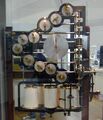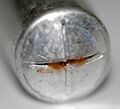Template:Selected anniversaries/March 22: Difference between revisions
No edit summary |
No edit summary |
||
| Line 1: | Line 1: | ||
<gallery> | <gallery> | ||
||1394 – Ulugh Beg, Persian astronomer and mathematician (d. 1449) | |||
||1499 – Johann Carion, German astrologer and chronicler (d. 1537) | |||
||1630 – The Massachusetts Bay Colony outlaws the possession of cards, dice, and gaming tables. | |||
File:Niels Steensen.png|link=Niels Steensen (nonfiction)|1647: [[Niels Steensen (nonfiction)|Niels Steensen]] uses [[scrying engine]] technology to locate fossils. These will later prove useful in detecting and counteracting [[crimes against mathematical constants]]. | File:Niels Steensen.png|link=Niels Steensen (nonfiction)|1647: [[Niels Steensen (nonfiction)|Niels Steensen]] uses [[scrying engine]] technology to locate fossils. These will later prove useful in detecting and counteracting [[crimes against mathematical constants]]. | ||
||1739 – Nader Shah occupies Delhi in India and sacks the city, stealing the jewels of the Peacock Throne. | |||
||1772 – John Canton, English physicist and academic (b. 1718) | |||
||1785 – Adam Sedgwick, English geologist and scientist (d. 1873) | |||
||1840 – Étienne Bobillier, French mathematician and academic (b. 1798) | |||
||1857 – Paul Doumer, French mathematician, journalist, and politician, 14th President of France (d. 1932) | |||
File:Robert Andrews Millikan.jpg|link=Robert Andrews Millikan (nonfiction)|1868: Physicist [[Robert Andrews Millikan (nonfiction)|Robert Andrews Millikan]] born. He will win the Nobel Prize for Physics in 1923 for the measurement of the elementary electronic charge and for his work on the photoelectric effect. | File:Robert Andrews Millikan.jpg|link=Robert Andrews Millikan (nonfiction)|1868: Physicist [[Robert Andrews Millikan (nonfiction)|Robert Andrews Millikan]] born. He will win the Nobel Prize for Physics in 1923 for the measurement of the elementary electronic charge and for his work on the photoelectric effect. | ||
File:Thomson_tide_calculator.jpg|link=Tide-predicting machine (nonfiction)|1869: Supervillain [[Neptune Slaughter]] steals [[Tide-predicting machine (nonfiction)|Thomson tide calculator]] for personal use; Steampunks outraged. | File:Thomson_tide_calculator.jpg|link=Tide-predicting machine (nonfiction)|1869: Supervillain [[Neptune Slaughter]] steals [[Tide-predicting machine (nonfiction)|Thomson tide calculator]] for personal use; Steampunks outraged. | ||
||1903 – Bill Holman, American cartoonist (d. 1987) | |||
File:Nathan Rosen.jpg|link=Nathan Rosen (nonfiction)|1909: Physicist [[Nathan Rosen (nonfiction)|Nathan Rosen]] born. He will develop the idea of the Einstein–Rosen bridge, later named the wormhole. | File:Nathan Rosen.jpg|link=Nathan Rosen (nonfiction)|1909: Physicist [[Nathan Rosen (nonfiction)|Nathan Rosen]] born. He will develop the idea of the Einstein–Rosen bridge, later named the wormhole. | ||
| Line 11: | Line 29: | ||
File:Tempest prognosticator.jpg|link=Tempest prognosticator (nonfiction)|1910: [[Tempest prognosticator (nonfiction)|Tempest prognosticator]] used to predict and prevent [[crimes against mathematical constants]]. | File:Tempest prognosticator.jpg|link=Tempest prognosticator (nonfiction)|1910: [[Tempest prognosticator (nonfiction)|Tempest prognosticator]] used to predict and prevent [[crimes against mathematical constants]]. | ||
||1913 – Ruggero Oddi, Italian physiologist and anatomist (b.1864) | |||
||1917 – Irving Kaplansky, Canadian-American mathematician and academic (d. 2006) | |||
||1924 – William Macewen, Scottish surgeon and neuroscientist (b. 1848) | |||
||1924 – Yevgeny Ostashev, the test pilot of rocket, participant in the launch of the first artificial Earth satellite, Lenin prize winner, Candidate of Technical Sciences (d. 1960) | |||
File:The Eel Escapes Hydrolab.jpg|link=The Eel Escapes Hydrolab|1929: Art critic and alleged supervillain [[The Eel]] attends birthday party for [[Nathan Rosen (nonfiction)|Nathan Rosen]]. They will later collaborate on ideas which will lead The Eel to construct a portable wormhole generator. | File:The Eel Escapes Hydrolab.jpg|link=The Eel Escapes Hydrolab|1929: Art critic and alleged supervillain [[The Eel]] attends birthday party for [[Nathan Rosen (nonfiction)|Nathan Rosen]]. They will later collaborate on ideas which will lead The Eel to construct a portable wormhole generator. | ||
||1932 – Larry Evans, American chess player and journalist (d. 2010) | |||
||1960 – Arthur Leonard Schawlow and Charles Hard Townes receive the first patent for a laser | |||
||1975 – A fire at the Browns Ferry Nuclear Power Plant in Decatur, Alabama causes a dangerous reduction in cooling water levels. | |||
||1978 – Karl Wallenda, German-American acrobat and tightrope walker, founded The Flying Wallendas (b. 1905) | |||
||1982 – NASA's Space Shuttle Columbia is launched from the Kennedy Space Center on its third mission, STS-3. | |||
File:Gerald Bull 1964.jpg|link=Gerald Bull (nonfiction)|1990: Engineer [[Gerald Bull (nonfiction)|Gerald Bull]] assassinated. He attempted to build artillery guns which could launch satellites into orbit. | File:Gerald Bull 1964.jpg|link=Gerald Bull (nonfiction)|1990: Engineer [[Gerald Bull (nonfiction)|Gerald Bull]] assassinated. He attempted to build artillery guns which could launch satellites into orbit. | ||
||1993 – The Intel Corporation ships the first Pentium chips (80586), featuring a 60 MHz clock speed, 100+ MIPS, and a 64 bit data path. | |||
||1995 – Cosmonaut Valeri Polyakov returns to earth after setting a record of 438 days in space. | |||
File:Exploded electrolytic capacitor.jpg|link=Capacitor plague (nonfiction)|2001: [[Capacitor plague (nonfiction)|Capacitor plague]] affects several brands of [[portable envy]] devices. | File:Exploded electrolytic capacitor.jpg|link=Capacitor plague (nonfiction)|2001: [[Capacitor plague (nonfiction)|Capacitor plague]] affects several brands of [[portable envy]] devices. | ||
File:Portable envy clock generator.jpg|link=Portable envy|2002: [[Portable envy]] components at risk of [[Capacitor plague (nonfiction)|capacitor plague]]. | File:Portable envy clock generator.jpg|link=Portable envy|2002: [[Portable envy]] components at risk of [[Capacitor plague (nonfiction)|capacitor plague]]. | ||
||2010 – James Black, Scottish biologist and pharmacologist, Nobel Prize laureate (b. 1924) | |||
||2012 – David Waltz, American computer scientist and academic (b. 1943) | |||
</gallery> | </gallery> | ||
Revision as of 09:34, 29 October 2017
1647: Niels Steensen uses scrying engine technology to locate fossils. These will later prove useful in detecting and counteracting crimes against mathematical constants.
1868: Physicist Robert Andrews Millikan born. He will win the Nobel Prize for Physics in 1923 for the measurement of the elementary electronic charge and for his work on the photoelectric effect.
1869: Supervillain Neptune Slaughter steals Thomson tide calculator for personal use; Steampunks outraged.
1909: Physicist Nathan Rosen born. He will develop the idea of the Einstein–Rosen bridge, later named the wormhole.
1910: Tempest prognosticator used to predict and prevent crimes against mathematical constants.
1929: Art critic and alleged supervillain The Eel attends birthday party for Nathan Rosen. They will later collaborate on ideas which will lead The Eel to construct a portable wormhole generator.
1990: Engineer Gerald Bull assassinated. He attempted to build artillery guns which could launch satellites into orbit.
2001: Capacitor plague affects several brands of portable envy devices.
2002: Portable envy components at risk of capacitor plague.








